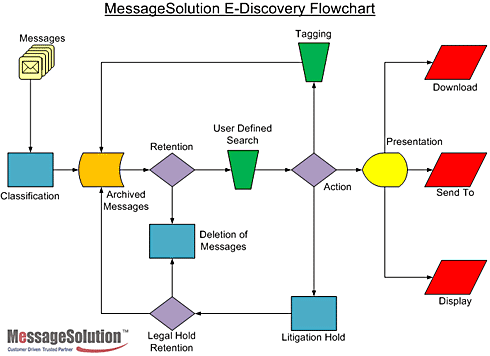| |
|
+ Enterprise eDiscovery Suite
|
 |
 |
|
| |
|
|
|
|
|
The Federal Rules of Civil Procedure (FRCP) are a set of guidelines set by the U.S. Supreme Court regulating court procedure for civil suits. FRCP often refers to revisions made in December of 2006 regarding electronic discovery, which became effective December 1, 2007. Electronic documents such as email, instant messages, or calendar files, and traditional documents stored electronically must be available for timely search and retrieval in the event of litigation proceedings. Discovery must be maintained in its original format. Accidental deletion, misplacement, or any inability to locate data before deadlines will result in court fines.
|
|
 |
|
Sign up |
|
 |
|
|
 |
MessageSolution eDiscovery Solutions |
|
|
As the technology leader in eDiscovery and live archiving space, MessageSolution's leading-edge technology built in search engine provides unique capability of making 'Concept' Google-like search to identify private information such as credit card number, social security number, patient ID number, insurance ID number or any specific privacy information, and redact this critical private information for attorneys to present to the external or opposing counsel, making MessageSolution the first in the market and the only archiving solution provider today truly compliant with privacy laws, and provide the highest integrity of information protection in the U.S. and EU countries.
MessageSolution eDiscovery for email servers, file systems and SharePoint provides integrated, easy-to-apply functionalities that IT forensics teams, paralegals, compliance officers and staff attorneys can use to search, review, cull down, preserve, and produce case-relevant data and documents from the centralized MessageSolution archive.
As early as November 2009, at Microsoft WinConnections Expo event MessageSolution was the first eDiscovery and archiving vendor in the market that delivered Exchange 2010 Web Services integration which provides all-data types and all metadata archiving for data integrity. MessageSolution's immediate access to the case-responsive information can provide enterprise clients with the ability to place quick litigation holds ordered by court, make critical early case assessments in a timely fashion, and export the documents to process in the next stage legal proceedings or present to opposing legal teams.

MessageSolution eDiscovery Suite processes voluminous amounts of documentation: searching, retrieving, reviewing, refining, redirecting, redacting, printing, and reserving all emails, attachments and files. Data retrieval is no longer limited by geographic location - MessageSolution eDiscovery Suite conveniently allows employees at all enterprise branches to search and access the email archive online or offline. MessageSolution
eDiscovery is a high performance litigation support system that removes roadblocks for corporate legal counsels and compliance officers.
MESSAGESOLUTION eDiscovery KEY FEATURES
■ Comprehensive electronic data discovery policy settings.
■ Legal counsel can easily review search results from the email archive without IT assistance.
■ Easily downlaod, open or send archived data.
■ Search baskets allow you to save search results to view later or share.
■ The archive generates a list of users' top ten most popular search terms, which users can perform again by clicking a top ten search.
■ WORM technology (Write Once Read Many) preserves the integrity of original documents.
■ Streamlined collection folders refine email data to further analysis and distribution.
■ Pinpoint capture and retrieve email online or offline for live court presentation or deposition process.
■ Litigation Hold on all archived emails and documents throughout entire organization.
■ Redaction for reporting obligations such as Privacy Act legislation, Sarbanes-Oxley Act 2002, the Electronic Freedom of Information Act 1996, and PCI compliance driven archiving & privacy data leaking protection: scheduled search to retrieve and monitor all personal data including numbers for credit card, social security, patient ID, medical diagnosis codes, driver license etc and place redaction on these sensitive information, before serving case-related documents with these blocked sensitive data to opposing legal team or serve the court mandates.
to top |
|
|